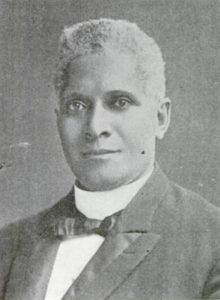
Alexander Walters
*Alexander Walters was born on this date in 1858. He was a Black clergyman and civil rights leader.
Walters was born in Bardstown, Kentucky, and was the oldest son of Henry and Harriet Walters. He was educated at a private school, taught by several teachers. In 1871, he moved to Louisville, Kentucky, where he worked as a waiter in private homes, hotels, and on steamboats. He was valedictorian of his high school class in 1875. Within two years, he was licensed to preach by the A.M.E. Zion Quarterly Conference, serving pastorates in Indianapolis, Louisville, San Francisco, Portland, Oregon, Chattanooga, and Knoxville, Tennessee, before his assignment to Mother Zion Church in New York City in 1888.
In 1889, the Walters were selected to represent the Zion Church in London at the World's Sunday School Convention and visited other parts of Europe, Egypt, and Israel. In May 1892, he was elected bishop of the Seventh District of the General Conference of the A.M.E. Zion Church, meeting in Pittsburgh. While in New York, he became acquainted with journalist Timothy Thomas Fortune, who was in the process of organizing his National Afro-American League, designed to protect Blacks against lynching and racial discrimination. Walters immediately endorsed the League, which met in early 1890 in Knoxville but went defunct by 1893.
In 1898, he became the first president of the National Afro-American Council, serving in that post for most of the next decade. In 1908, Walters refused an offer by W. E. B. Du Bois merged the Council with the Niagara Movement and two other organizations. Walters angered many Black followers by endorsing Democratic presidential candidate William Jennings Bryan in 1908. The Council soon dissolved, but Walters wasted little time seeking a new power base, emerging as president of the new National Independent Political League. In the 1910s, he joined the new National Association for the Advancement of Colored People (NAACP) and the National Urban League. Walters traveled abroad frequently, including frequent trips to London, where he attended the Pan-African Conference in 1900, giving a paper entitled "The Trials and Tribulations of the Colored Race in America," and visited West Africa in 1910 and the Caribbean in 1911.
A well-respected figure internationally, he declined an offer in 1915 by U.S. President Woodrow Wilson to become U.S. minister to Liberia. Walters died on February 2, 1917, in New York City, of natural causes. Walters was married three times and had six children. His first wife, Katie Knox Walters, died in 1896; his second wife, Emeline Virginia Byrd Walters, died in 1902. He was survived by his third wife, Lelia Coleman Walters. Following his death, his widow was employed as a clerk for the United States Bureau of Immigration on Ellis Island. The couple's son, Hillis Walters, was an actor in the 1920s and 1930s during the Harlem Renaissance and, later, a composer. His most successful composition was the song "Pass Me By" (1946), with lyrics by Mercer Ellington. It was recorded by Lena Horne, Carmen McRae, and Peggy Lee.
His funeral was at Zion Church. Bishop G. W. Clinton delivered his eulogy, and Bishop J. S. Caldwell conducted the services, assisted by Rev J. W. Brown. Bishop Walters is buried in Mother Zion's Cypress Hill Cemetery in Brooklyn, New York.